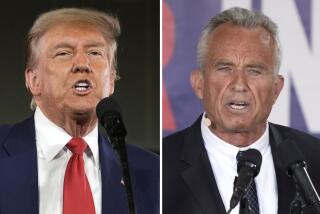Anti-Nuclear Stance OKd by Canada Party
OTTAWA — The Liberal Party on Sunday ended a national convention after adopting as official party policy measures to ban U.S. testing of cruise missiles in Canada and to prevent nuclear-equipped American and other allied planes and ships from entering Canadian territory and waters.
The Liberals are the principal opposition to the Progressive Conservative government of Prime Minister Brian Mulroney.
The weapons measures were among a long list of policy declarations that moved the Liberals sharply to the left. At the same time--and symptomatic of the ironic and often contradictory nature of the convention--John Turner, one of Canada’s least popular national politicians, was reaffirmed as party leader by the 2,600 convention delegates.
Turner told reporters Sunday that, “while not strictly binding” on the party if it wins the next election, the new policy resolutions are “highly persuasive and set the direction of the party.”
He indicated that past Liberal Party backing for cruise missile testing and permission for nuclear-carrying ships and planes to enter Canadian territory will be re-examined.
If the newly proclaimed Liberal policies were eventually carried out as they are now written, Canada would effectively, if not officially, withdraw as a member of the North Atlantic Treaty Organization.
The situation would be close to that of New Zealand, which has banned American nuclear-armed or -powered ships from its ports, despite a defense treaty between the United States, Australia and New Zealand.
NATO policy allows American and other allied planes and ships to use members’ waters and airspace for treaty purposes without disclosing whether they are nuclear equipped. Since U.S. policy is never to announce what weapons are on board its vessels, the Liberal Party policy, as it stands, would ban all American planes and ships from Canadian territory.
Rejected NATO Withdrawal
But almost as if to symbolize the confusing state of the convention, the delegates also narrowly turned down a resolution calling for Canadian withdrawal from NATO.
And while it is true that the resolutions might not be binding, the sentiment they represent reflects growing Canadian disenchantment with American defense policy, and key party parliamentary members said Turner will adhere to the resolutions.
“He had better,” said John Nunziata, a Liberal member of Parliament. “He said he would follow the democratic decisions of the grass roots.”
The delegates approved several resolutions to strengthen and expand Canada’s already extensive social welfare system, and they ordered major reforms in the party structure to increase the power of local members at the expense of traditional leadership centers.
Although Turner was once a member of the old style power structure to such an extent that he first won the leadership in 1984 because of the activities of the so-called “back-room boys,” he managed to get on the reform bandwagon in time to maintain his position this year.
Leadership Review
Under a complicated system of leadership review, the convention was asked to vote on a resolution calling for yet another convention within the next year to vote on a new leader.
All Turner needed to prevent such a move was a 50%-plus-one vote against the resolution, but tradition demanded that he receive an undetermined, but much stronger, endorsement.
While Turner refused in advance to fix that percentage, most observers said that he needed at least 70% to stay in office. He received 76.3% of the 2,623 votes and declared afterward, “Now I know I have your confidence.”
Although Turner thus easily turned back the challenge to his leadership, he did it by reversing many of the beliefs that propelled him into power in the first place, particularly his support for a more conservative fiscal policy and strong relations with the United States.
He made no mention of the national budget deficit, which is nearly 2 1/2 times larger than that of the United States in per capita terms, and he joined in the strong element of anti-Americanism that marked the convention.
Americans ‘Not Our Landlords’
During a speech Saturday, Turner said, “We need to assert our sovereignty, our independence. We respect our American neighbors, but we are not tenants, and they are not our landords. . . . Good fences make good neighbors.”
Turner then renewed attacks on current U.S.-Canadian free trade negotiations by saying that no agreement acceptable to Washington would be acceptable to Canada.
In spite of Turner’s decisive victory and his joining in the leftward trend of the party, it remained uncertain whether Turner could recover from his 1984 electoral loss to Mulroney and the Progressive Conservatives.
Suffering the worst election defeat in Canadian history, Turner saw two decades of Liberal Party domination of Parliament end when his party won just over 40 of 282 seats.
His personal popularity has been low ever since, with polls consistently showing him to be the least popular figure among leaders of the nation’s three top parties.
Turner clearly is gambling that his new leftward shift and his alignment with reformers inside the party will pay off. He sharply attacked the past party establishment, and even after his convincing victory Sunday, he refused to offer even a hint of conciliation to his foes inside the party.
More to Read
Sign up for Essential California
The most important California stories and recommendations in your inbox every morning.
You may occasionally receive promotional content from the Los Angeles Times.










